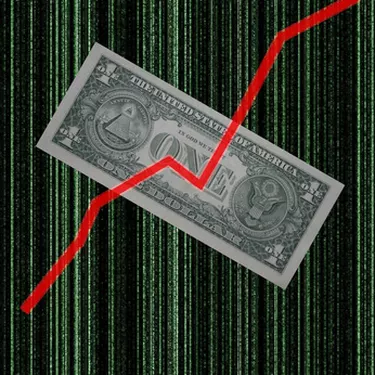
Stocks, bonds and commodities are all items traded on a stock exchange market, such as the New York Stock Exchange or the London Stock Exchange. They all represent an investible and tradable asset, which can be owned for minutes or years. Each of these assets can be held by individuals, companies, mutual funds, pension and retirement plans and even governments.
Stocks
Video of the Day
The New York Stock Exchange defines a stock as "an ownership interest in a corporation." Also known as capital stock, shares or equities, stocks are the individual pieces of a company that are issued in return for money, used to fund corporate growth and investment. Stock prices reflect the buy or sale price of stocks at a given moment. For example, if GE stock is priced at $17.50, it means you can acquire one share of GE at that price.Other classes of stocks include preferred stocks, which pay a fixed dividend, or restricted stocks, which have special trading conditions.
Video of the Day
Bonds
Bonds, also known as notes or debentures, are a debt promise, issued by a company or government. Bonds are secured against the assets of the issuer, with a guaranteed rate of return. Bonds are not shares in the issuer and convey no ownership. They furnish a means for companies and governments to raise money and are traded openly on the markets. Bonds have maturities in three categories, short (less than a year), medium (1 to 10 years) and long (over 10 years). Government bonds are also known as Treasuries or T-bills and are regarded as the safest of all investments.
Commodities
Commodities are physical tradable goods listed on the stock market. Common commodities traded are metals, such as gold, silver and copper, agricultural products, such as corn, coffee and soybeans, and industrial commodities like oil and gas. Special exchanges exist to facilitate trading commodities. Great attention is paid to certain economically and politically sensitive commodities like oil and gold. Because oil in particular is widely used in many petroleum products, gasoline and plastics, changes to the oil price can have wide economic consequences.
Owning, Pricing and Trading
Each asset type can be traded and purchased by individual investors. However, each has its own ownership and trading style.
Stocks are bought and sold, held in a portfolio and accumulated over time. Some pay out a dividend as a profit share from the company.
Bonds are also traded, but are longer term investments, paying a fixed yield per annum. Bonds are offered at $1,000 par value or face value, that is, the amount the issuer promises to pay at maturity. Yields offered on new bonds change each time new bonds are issued.
Commodities are the most volatile of the three classes of assets, since they rely on physical supply and demand. Crop failure, overproduction, bad weather, political instability, consumer appetite, among other factors, directly influence the daily changes in prices. Speculation also disproportionately affects commodities more than stocks or bonds. Commodities are priced differently. Each has a "spot price" and a "future price." For example, oil spot prices reflect the price of oil if it were to be delivered at that moment. Future prices are market expectations based on all the external factors that can influence the commodity coming to market.
Rewards and Risks
Investing in stocks, bonds and commodities offers risk and rewards. The main difference among them is a function of risk tolerance and time. Short-term investing can bring high risk and high rewards, longer term investing can bring lower risks and more stable returns. The consensus among financial experts is that a mixed portfolio with all three asset classes produces the best long-term investment strategy.